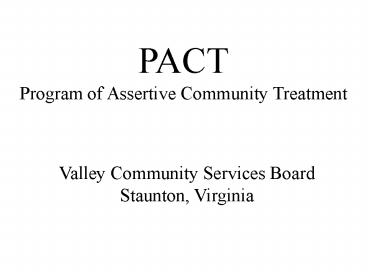PACT PowerPoint PPT Presentation
1 / 8
Title: PACT
1
PACT Program of Assertive Community Treatment
Valley Community Services Board Staunton, Virginia
2
Origins of Assertive Community Treatment
- Deinstitutionalization in the 1960s -
Inadequate and uncoordinated outpatient
services - Training In Community Living (TCL),
Madison, WI Leonard Stein, M.D., Arnold Marx,
M.D., and Mary Ann Test, Ph.D. - Marx, Test
and Stein (1973) pilot study - Stein and Test
(1980) 12 month follow-up - TREATMENT,
REHABILITATION, AND SUPPORT
3
Stein and Test (1980)
TCL group showed - significantly less time in
hospital - improved occupational functioning /
employment - improved social functioning -
fewer symptoms - increased independent living -
increased medication compliance - no increased
burden on families / society - better subjective
life satisfaction - lower cost
4
TREATMENT
REHABILITATION
Psychopharmacology Supportive Therapy Cognitive
Behavioral Therapy Crisis Intervention Hospitaliza
tion Substance Abuse Treatment Medication
Monitoring
Structuring Time Employment Activities of Daily
Living Use of Leisure Time Social / Interpersonal
Relationships Family Social Skills Training
SUPPORT
Families Children
5
Characteristics of PACT Model - Multidisciplinary
teams - Low caseloads (110 staffpatient) - Role
sharing / shared caseloads - Individually
tailored treatment plans - Assertive approach,
emphasizes outreach -Attention to Relationship
Building - Staff availability round the clock /
crisis services - in vivo treatment (outside of
office setting) - Help with basic material needs
(food, shelter, clothing, medical care) -
Medication monitoring as needed - Continuous care
(no discharge) - Flexibility - Vocational
6
Target Population
Those in greatest need
- severe and persistent mental illness - Axis I
diagnosis of Schizophrenia, Schizoaffective
Disorder or Bipolar Disorder - high hospital
users - high users of emergency / crisis
services - high legal involvement - medication
noncompliance - homelessness or risk for
homelessness - may be substance abusers / dual
diagnosis - difficulty meeting basic survival
needs in the community
7
Treatment Offered
Psychiatric Evaluation and Treatment Case
Management Medication Monitoring Supportive
Therapy Substance Abuse Treatment Vocational
Assessment and Support Family - Support /
Education / Respite Psycho-education Relapse
Prevention Skills Symptom Management Crisis /
ER Money Management (rep payee) Help in Accessing
Community Resources Community Outreach Coordinatio
n of Overall Medical Treatment Teach Basic Skills
of Community Living / Coping Strategies
8
Role of the Psychiatrist
Co-leader of team Oversight of patients overall
treatment Oversight of general functioning of
team Psychiatric evaluation and medication
monitoring Supportive therapy Clinical
supervision of nursing staff Medical policies and
procedures Coordination of patients general
medical care
On-call 24-7 Active involvement as team
member Flexibility Smaller caseloads

